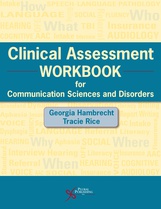Publication
Clinical Assessment Workbook for Communication Sciences and Disorders
- Details:
- 301 pages, Illustrated (B/W), Spiral Bound, 8.5 x 11"
- ISBN13:
- 978-1-63550-034-9
- Release Date:
- 02/07/2019
Overview
Clinical Assessment Workbook for Communication Sciences and Disorders provides students in speech-language pathology with a hands-on approach to learning the clinical assessment process. Throughout the workbook, the authors have combined basic assessment information with meaningful assignments to provide real-life applications. Each chapter is structured with a "who, what, why, when, where, and how" format to provide the most comprehensive coverage of assessment in clinical settings.
Topics covered range from referrals to the recommendation stage, and include processes such as standardized testing, report writing, billing, and insurance. The workbook covers the full range of communication disorders, including, speech sound disorders, voice, fluency, swallowing, language, and hearing.
Key Features
- Each chapter contains a list of "Top 10 Terms" for a review of key concepts
- Chapter Tips provide a quick and easy summary of suggestions for each area of assessment
- Chapter activities, with answers, allow students to practice real-life clinical situations in a low-stakes environment
- Clinical forms and charts aid in understanding of chapter content
This much-needed interactive resource will aid students in their understanding and knowledge related to appropriate protocols for assessment.
Reviews
Sandra R. Ciocci, PhD, CCC-SLP, Professor, Communication Sciences and Disorders, Bridgewater State University (2018):
"This is an excellent endeavor by these authors. The activities are exceptional and will promote student learning in a practical way. The organization of Who, What, Where, etc. is consistent in each chapter and will give the student a good format for considering assessment in each disorder area. Excellent activities and questions are at the end of the chapters. The workbook is very well written, clear, accurate, organized, easy to follow and understand. Students will appreciate these authors' efforts to help them learn about the assessment process."Rosalie Marder Unterman, PhD, CCC-SLP, Associate Professor/Clinical Director, Speech-Language Pathology, Touro College (2018):
"I think this will be a very useful text for the beginning SLP. The style of asking organizational questions: who, what, why, when, where, how is used throughout the chapters. This consistency of presentation allows the novice reader to understand the different parameters of each topic. The basics of assessment are covered, as well as specifics relating to a wide variety of speech/language/hearing/swallowing disorders. The information is accurate and clearly relevant."Keri Parchman-Gonzalez, MA, CCC-SLP, Department of Communication Sciences and Disorders, The University of Texas Rio Grande Valley (2018):
"I would recommend this textbook. The chapters are updated and include areas which ASHA addresses in standards. I would use this text in class because it asks the correct questions and provides the learner with updated information. I would recommend this text to students. Students want quick, easy information provided and professors want the ability to have good discussions . . . which each chapter provides. The information provided can be used for clinicians going into any work arena."
Acknowledgments
Reviewers
Chapter 1. Introduction to Assessment
Chapter 2. Referrals
Chapter 3. Intake and Interview
Chapter 4. Oral Facial Examinations
Chapter 5. Standardized Testing
Chapter 6. Statistical Basis
Chapter 7. Dynamic Assessment
Chapter 8. Observation
Chapter 9. Synthesizing Information
Chapter 10. Report Writing
Chapter 11. On-going Assessment
Chapter 12. Hearing Assessment
Chapter 13. Billing
Chapter 14. Insurance
Chapter 15. Speech Sound Disorders
Chapter 16. Voice Assessment
Chapter 17. Fluency Assessment
Chapter 18. Dysphagia Assessment
Chapter 19. Language/Literacy in Children
Chapter 20. Adult Language Assessment
Chapter 21. Cognitive Assessment
Chapter 22. Social Communication Assessment
Chapter 23. Communication Modalities
Chapter 24. Final Thoughts
Index
About The Authors
Georgia Hambrecht, PhD, is a Professor of Communication Sciences and Disorders at Western Carolina University. She has earned a Doctoral degree from Kent State University; a Master's degree from Western Illinois University, and a Bachelor's degree from Bowling Green State University. She has taught in the university setting for over 35 years in Indiana and North Carolina. Dr. Hambrecht has written and presented in the areas of Autism Spectrum Disorders, Deafblindness, Clinical Observation, and the Scholarship of Teaching and Learning (SoTL). She has received various honors, including Western Carolina University College of Health and Human Science Board of Governor's Innovative Teaching Award in 2007 and 2018, Indiana Association of Colleges for Teacher Education Distinguish Teacher Educator Award, Indiana State University School of Education's Coffman Distinguished Professor Award and Indiana State University President's Metal.
Tracie Rice, AuD, is an Associate Professor in the Communication Sciences and Disorders department at Western Carolina University. She earned a Clinical Doctorate degree from The University of Florida; a Masters degree from The University of Tennessee, and a Bachelors degree from Western Carolina University. She has taught in the university setting for over 15 years and has been the Speech and Hearing Clinic director for over 10 years. Dr. Rice has written and presented on topics such as observations, electronic health records and auditory processing.
Related Titles
Professional Communication in Speech-Language Pathology
A Embry Burrus, Laura B. Willis
254 pages, Illustrated (B/W), Softcover, 7 x 10"
Assessment of Communication Disorders in Children
571 pages, Illustrated (B/W), Softcover, 8.5 x 11"
Basic Audiometry Learning Manual
Mark DeRuiter, Virginia Ramachandran
216 pages, Color Illustrations (2 Color), Spiral Bound, 8.5 x 11"
Clinical Workbook for Speech-Language Pathology Assistants
Robert Kraemer, Jacqueline Bryla
278 pages, Illustrated (B/W), Spiral Bound, 8.5 x 11"
Assessment of Communication Disorders in Adults
496 pages, Illustrated (B/W), Softcover, 8.5 x 11"
Assessing Middle Ear Function in Infants
Edited by: Joseph Kei, Fei Zhao
200 pages, Illustrated (B/W), Softcover, 7 x 10"













